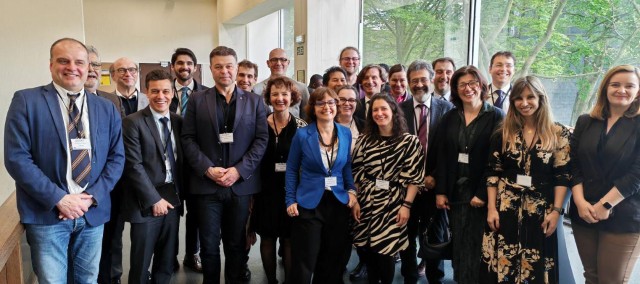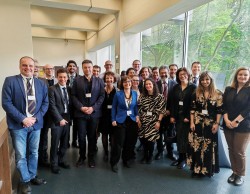Towards a common European diplomaReview of the "A Blueprint for a European degree" conference organized by the European Commission

On 29 April, Brussels hosted a major conference on the creation of a European diploma, bringing together more than 1,000 face-to-face and online participants. Representatives of Europe's higher education institutions called on the European Commission, Member States and the higher education sector to take concrete steps to implement this ambitious initiative. They stressed the importance of strong coordination between Member States, legislative reform and adequate funding at European, national and regional levels to reshape the higher education landscape in Europe.
Context
In response, 10 Erasmus+ pilot projects have started in spring 2023. UPPA, through UNITA, is part of two of them: SMARTT1 (Screening, Mapping, Analysing, REcommending, Transferring and Transforming Higher Education international programmes) and EGAI2 (European Grouping of Academic Interest).
This "European diploma" label is a first step towards a common diploma. It promotes student mobility and cooperation, by recognising the skills acquired through participation in multilingual and transdisciplinary programmes in several institutions and countries. This label would complement the qualifications obtained through transnational cooperation between higher education institutions, such as European universities.
The selected projects explore, test and formulate recommendations to facilitate the development and implementation of joint degrees in Europe. Four of them are also examining a potential European legal status for these alliances, aimed at enabling universities to cooperate more closely, take joint strategic decisions and share resources, particularly in terms of research and innovation.
First results
This conference was the first major event following the Erasmus+ call. The UPPA was represented by Arnaud Lecourt (professor of private law and criminal sciences and EGAI scientific manager at the UPPA), Ernesto Exposito (vice-president in charge of international relations), Florian Gaillard (post-doctoral student in competition law recruited on the EGAI project) and other experts, who emphasised the added value of institutionalised transnational cooperation via the European diploma. This cooperation is beneficial for students, staff, employers, higher education institutions and the European Union as a whole.
- SMARTT project: This project, which brings together 4 European alliances (including UNITA), aims to create a European diploma, facilitating the setting up of joint transnational programmes and stimulating student mobility. It is based on common criteria agreed at European level and helps to improve the quality of teaching.
- EGAI project: Launched in April 2023, EGAI explores the use of a European Economic Interest Grouping (EEIG) as a tool for academic cooperation. It has led to the creation of an innovative new model, the European Academic Interest Grouping (EAIG), and to the drafting of a proposal for an EU regulation. Its characteristics, specific features and advantages were presented at the Brussels conference.
Next steps
The blueprint proposal marks the start of formal discussions with the Council of the European Union to adopt the European criteria, and with Member States to initiate the necessary reforms. The pilot projects wish to use the knowledge acquired to continue discussions with the European Commission and the Member States, in order to define the principles and criteria for the European diploma and the definition of the framework of legal entities for European alliances.
In autumn 2024, the Commission will present a final report summarising the results of the Erasmus+ pilot projects. This report will be a crucial step towards the implementation of a common European diploma, which promises to transform higher education in Europe.
The full recording of the conference is available on Youtube.
